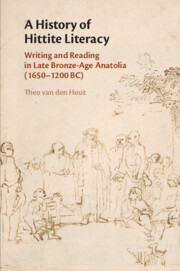Book contents
- A History of Hittite Literacy
- A History of Hittite Literacy
- Copyright page
- Dedication
- Contents
- Figures
- Tables
- Preface and Acknowledgments
- Map
- Timeline and Hittite Kings
- Sigla and Abbreviations
- Chapter 1 Introduction
- Chapter 2 Writing and Literacy among the Anatolians in the Old Assyrian Period
- Chapter 3 From Kanesh to Hattusa
- Chapter 4 First Writing in Hattusa
- Chapter 5 Literacy and Literature in the Old Kingdom until 1500 BC
- Chapter 6 The Emergence of Writing in Hittite
- Chapter 7 A Second Script
- Chapter 8 The New Kingdom Cuneiform Corpus
- Chapter 9 The New Kingdom Hieroglyphic Corpus
- Chapter 10 The Wooden Writing Boards
- Chapter 11 The Seal Impressions of the Westbau and Building D, and the Wooden Tablets
- Chapter 12 In the Hittite Chancellery and Tablet Collections
- Chapter 13 Scribes and Scholars
- Chapter 14 Excursus
- Chapter 15 The End and Looking Back
- Bibliography
- Index Locorum
- General Index
Chapter 12 - In the Hittite Chancellery and Tablet Collections
Published online by Cambridge University Press: 18 December 2020
- A History of Hittite Literacy
- A History of Hittite Literacy
- Copyright page
- Dedication
- Contents
- Figures
- Tables
- Preface and Acknowledgments
- Map
- Timeline and Hittite Kings
- Sigla and Abbreviations
- Chapter 1 Introduction
- Chapter 2 Writing and Literacy among the Anatolians in the Old Assyrian Period
- Chapter 3 From Kanesh to Hattusa
- Chapter 4 First Writing in Hattusa
- Chapter 5 Literacy and Literature in the Old Kingdom until 1500 BC
- Chapter 6 The Emergence of Writing in Hittite
- Chapter 7 A Second Script
- Chapter 8 The New Kingdom Cuneiform Corpus
- Chapter 9 The New Kingdom Hieroglyphic Corpus
- Chapter 10 The Wooden Writing Boards
- Chapter 11 The Seal Impressions of the Westbau and Building D, and the Wooden Tablets
- Chapter 12 In the Hittite Chancellery and Tablet Collections
- Chapter 13 Scribes and Scholars
- Chapter 14 Excursus
- Chapter 15 The End and Looking Back
- Bibliography
- Index Locorum
- General Index
Summary
Hittite records can be classified as either short-term or long-term texts. Within the latter group we distinguish semi-current and permanent records. The various tasks of scribes working for the state are discussed in this chapter: drafting new documents, either from scratch or using earlier, related documents, copying and editing existing compositions, and reading. As part of the discussion about editing, an attempt is made to make sense of a number of closely related but still largely unclear technical terms found in many colophons. Finally, the question of tablet storage is addressed. Given the confusing archaeological context in which most Hittite tablets and fragments have been found there is little certainty to be gained. A case is made for a smaller rather than larger number of scribal “offices” and estimates of the original total of tablets present at any time in the tablet collections of the thirteenth century are discussed. An appendix gives a concrete example of what text editing might have looked like.
Keywords
- Type
- Chapter
- Information
- A History of Hittite LiteracyWriting and Reading in Late Bronze-Age Anatolia (1650–1200 BC), pp. 234 - 286Publisher: Cambridge University PressPrint publication year: 2021

